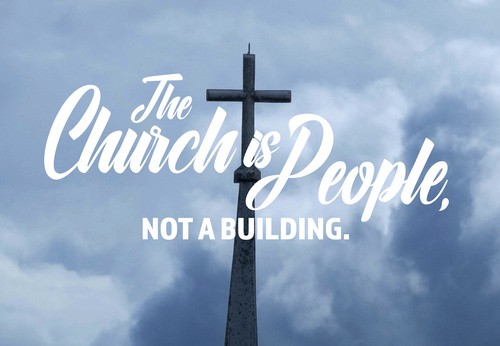Made for Community
The Scriptures emphasize the importance of community and togetherness. God said, “It is not good for man to dwell alone.” While He was speaking of marriage, it does apply to the other relationships in our lives. I recently saw this outline and thought it well states the Biblical and common sense case for pursuing relationships with others.
1. We Are Made for Community
1. We Are Made for Community
- Genesis 2:18 – “It is not good for the man to be alone. I will make a helper suitable for him.”
- From the beginning, God designed people to be in relationships, not isolation.
- Hebrews 10:24-25 – “And let us consider how we may spur one another on toward love and good deeds, not giving up meeting together, as some are in the habit of doing, but encouraging one another—and all the more as you see the Day approaching.”
- The Bible stresses the importance of gathering together and supporting each other in faith.
- Ecclesiastes 4:9-10 – “Two are better than one, because they have a good return for their labor: If either of them falls, one can help the other up.”
- Life is easier when people work together and support each other.
- 1 Corinthians 12:12-14 – “Just as a body, though one, has many parts, but all its many parts form one body, so it is with Christ. For we were all baptized by one Spirit so as to form one body—whether Jews or Gentiles, slave or free—and we were all given the one Spirit to drink.”
- The Church is described as one body with many members, emphasizing the need for unity among believers.
- Colossians 3:13-14 – “Bear with each other and forgive one another if any of you has a grievance against someone. Forgive as the Lord forgave you. And over all these virtues put on love, which binds them all together in perfect unity.”
- Love is the key to true unity and togetherness.
- Galatians 6:2 – “Carry each other’s burdens, and in this way you will fulfill the law of Christ.”
- We are called to help and support each other in difficult times.
- Acts 2:42-47 – Describes the early church as a community that shared everything, ate together, and supported each other in faith.
- Romans 12:10 – “Be devoted to one another in love. Honor one another above yourselves.”
- Hebrews 13:2 – “Do not forget to show hospitality to strangers, for by so doing some people have shown hospitality to angels without knowing it.”

Conclusion
The Bible teaches that true community is built on love, humility, service, and unity. Whether in church, family, or friendships, believers are called to live in harmony, encourage one another, and work together for the glory of God.
Building stronger community relationships takes intentionality, kindness, and consistency. Here are some practical ways, based on biblical principles, to strengthen your sense of community and togetherness:
1. Be Present and Engage Regularly
True community takes effort, but it’s worth it. When we invest in relationships with love, patience, and service, we reflect God’s design for unity.
The Bible teaches that true community is built on love, humility, service, and unity. Whether in church, family, or friendships, believers are called to live in harmony, encourage one another, and work together for the glory of God.
Building stronger community relationships takes intentionality, kindness, and consistency. Here are some practical ways, based on biblical principles, to strengthen your sense of community and togetherness:
1. Be Present and Engage Regularly
True community takes effort, but it’s worth it. When we invest in relationships with love, patience, and service, we reflect God’s design for unity.
The Bible teaches that true community is built on love, humility, service, and unity. Whether in church, family, or friendships, believers are called to live in harmony, encourage one another, and work together for the glory of God.
Building stronger community relationships takes intentionality, kindness, and consistency. Here are some practical ways, based on biblical principles, to strengthen your sense of community and togetherness:
1. Be Present and Engage Regularly
- Hebrews 10:25 – “Not giving up meeting together, as some are in the habit of doing, but encouraging one another.”
- Make it a priority to attend church, community gatherings, or small groups.
- Regular interaction builds trust and deepens relationships.
- Romans 12:10 – “Be devoted to one another in love. Honor one another above yourselves.”
- Take time to listen to others, ask about their lives, and follow up on concerns.
- Small acts of kindness, such as sending a message, visiting, or lending a helping hand, strengthen bonds.
- Galatians 6:2 – “Carry each other’s burdens, and in this way you will fulfill the law of Christ.”
- Offer practical help when people are struggling—whether it’s emotional, financial, or physical support.
- Volunteer in church or local community efforts.
- Colossians 3:13 – “Bear with each other and forgive one another if any of you has a grievance against someone.”
- Conflict is inevitable, but resolving it with grace and forgiveness strengthens relationships.
- Avoid gossip and negativity—focus on unity and peace.
- Hebrews 13:2 – “Do not forget to show hospitality to strangers.”
- Invite people over for meals, coffee, or just good conversation.
- Being welcoming and creating a warm atmosphere makes others feel valued.
- James 5:16 – “Therefore confess your sins to each other and pray for each other so that you may be healed.”
- Ask people how you can pray for them and follow up.
- Pray together—there’s power in community prayer.
- 1 Thessalonians 5:11 – “Therefore encourage one another and build each other up.”
- Speak words of encouragement, affirm others, and celebrate their successes.
- Be a source of hope and positivity.
- Make a habit of reaching out to new people and forming deeper friendships.
- Find ways to connect—join a ministry, participate in group activities, or engage in shared interests.
True community takes effort, but it’s worth it. When we invest in relationships with love, patience, and service, we reflect God’s design for unity.
The Bible teaches that true community is built on love, humility, service, and unity. Whether in church, family, or friendships, believers are called to live in harmony, encourage one another, and work together for the glory of God.
Building stronger community relationships takes intentionality, kindness, and consistency. Here are some practical ways, based on biblical principles, to strengthen your sense of community and togetherness:
1. Be Present and Engage Regularly
- Hebrews 10:25 – “Not giving up meeting together, as some are in the habit of doing, but encouraging one another.”
- Make it a priority to attend church, community gatherings, or small groups.
- Regular interaction builds trust and deepens relationships.
- Romans 12:10 – “Be devoted to one another in love. Honor one another above yourselves.”
- Take time to listen to others, ask about their lives, and follow up on concerns.
- Small acts of kindness, such as sending a message, visiting, or lending a helping hand, strengthen bonds.
- Galatians 6:2 – “Carry each other’s burdens, and in this way you will fulfill the law of Christ.”
- Offer practical help when people are struggling—whether it’s emotional, financial, or physical support.
- Volunteer in church or local community efforts.
- Colossians 3:13 – “Bear with each other and forgive one another if any of you has a grievance against someone.”
- Conflict is inevitable, but resolving it with grace and forgiveness strengthens relationships.
- Avoid gossip and negativity—focus on unity and peace.
- Hebrews 13:2 – “Do not forget to show hospitality to strangers.”
- Invite people over for meals, coffee, or just good conversation.
- Being welcoming and creating a warm atmosphere makes others feel valued.
- James 5:16 – “Therefore, confess your sins to each other and pray for each other so that you may be healed.”
- Ask people how you can pray for them and follow up.
- Pray together—there’s power in community prayer.
- 1 Thessalonians 5:11 – “Therefore, encourage one another and build each other up.”
- Speak words of encouragement, affirm others, and celebrate their successes.
- Be a source of hope and positivity.
- Make a habit of reaching out to new people and forming deeper friendships.
- Find ways to connect—join a ministry, participate in group activities, or engage in shared interests.
True community takes effort, but it’s worth it. When we invest in relationships with love, patience, and service, we reflect God’s design for unity.
Posted in community, buildingcommunity, Unity, serving, hospitality, forgive, uplift, intentionality, buildrelationships
Recent
Archive
2026
2025
2024
2022
January
February
April
November
December
2021
November

No Comments